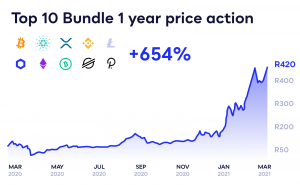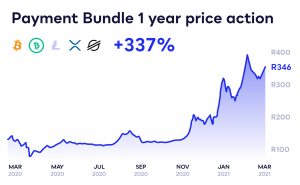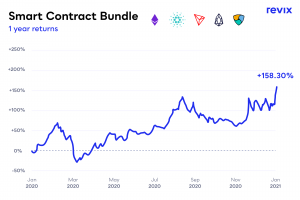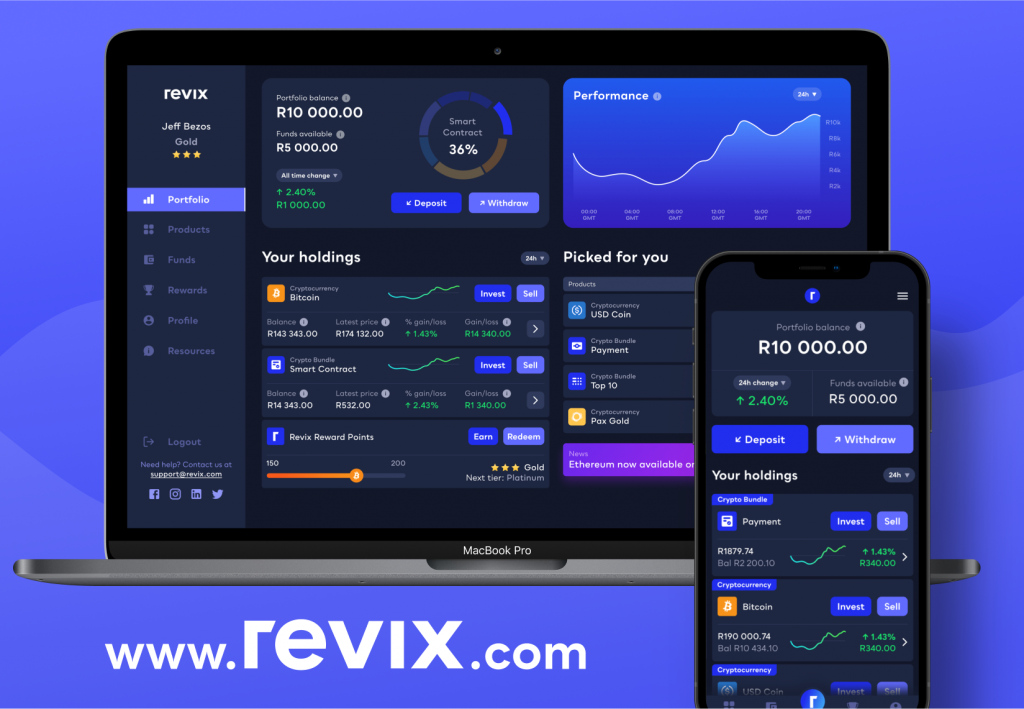We all have them. Those apps we open without thinking. Not because we need anything in particular, but because they feel… safe, in some…
Bitcoin goes mainstream

If you bought bitcoin on the 10th of October 2010 when it was worth 10c and invested $100 (R1 500) you would have been able to buy 1,000 bitcoins. Today that same investment would be worth an incredible $55-million (R853-million).
Cryptocurrency is going mainstream faster than anyone expected
Bitcoin has been on a remarkable trajectory that’s outpaced other investments including stocks, property, and commodities. Bitcoin wrapped up 2020 just a tad shy of $29 000 (R420,000). So far in 2021, the price has nearly doubled, soaring to around $55 000 (R860,000) as it benefits from increasing institutional adoption.
Some market observers attribute the robust advance of Bitcoin’s price to the strong demand from buyers seeking to hedge against market inflation.
“It’s the best-performing asset of the last decade for sure,” said Sean Sanders, CEO, and founder of Cape Town-based crypto investment platform Revix which is backed by JSE-listed Sabvest.
What’s driving these returns?
Most recently, the price has been driven by high-profile support. Bank of New York Mellon said it would provide custody services for crypto assets, citing growing client demand.
In February, Mastercard also said it would begin to offer support for cryptocurrencies on its network this year. And, Tesla announced that it had bought $1.5-billion of bitcoin and that it would soon start to accept the currency as payment. Everyday investors have also been piling into the bitcoin and cryptocurrency market with an estimated 180 million people worldwide engaging with cryptocurrencies.
“We’ve been wondering what it would take to catapult crypto into mainstream adoption and over the last few months we seem to have found the answers,” says Sean Sanders. “To say that the past year has been one of the most important in crypto’s history would be an understatement.”
“For those of us working full time in crypto for several years, much of what has transpired this last year felt inevitable. We always believed that large institutions like PayPal would help normalise crypto for everyday use and institutional investors would come around to this new asset class,” says Sanders.
“What’s remarkable is that it all seems to be happening at the same time. This is becoming a reinforcing cycle, where positive adoption news – like that of PayPal entering the crypto space, or Tesla’s bullish outlook on crypto – puts pressure on other big-name payment institutions and financial firms to do the same.”
Where to from here?
The entire crypto market, up +120% this year which is ahead of Bitcoin’s 98% gain, is now worth nearly $1.8-trillion in total, which is just below the value of the world’s most valuable company – Apple.
“While cryptocurrency has now been around for more than a decade, it’s still ‘new’ in the grand scheme of things, and to many it’s still somewhat of an unknown investment class. At the same time, cryptocurrency is going to continue to evolve. The ways we use it, the ways we invest in it, and the different things it can accomplish are going to keep changing and expanding in the years to come.
“In the coming months, we expect to see large banks launch crypto custody services, and brokerages open up access to crypto products, to see more retailers displaying ‘We accept crypto’ signs, large institutions building major applications on public blockchains – and we expect investment conversations to transition from ‘Why should I invest?’ to ‘Why aren’t we already invested?’
“As with all new technologies, the journey for crypto will continue to have its ups and downs. Price corrections are to be expected and are healthy. But one thing is becoming clear: crypto is arriving now, and the time to get ahead of crypto’s mainstream breakout is starting to run short. The next six months are likely to change the game.”
He continues: “In just 11 years, bitcoin has gone from nothing to an awe-inspiring creator of wealth. At this point, whether prices go to the moon, stagnate, or correct, the cryptocurrency is becoming impossible to ignore in an increasingly dysfunctional global financial and monetary system.
“The growing involvement of major players in the financial services realm supports the staying power of the asset class and validates other people getting involved. I think bigger players better understand that buying bitcoin and putting it in their portfolio is meant to be a store of value, an inflation hedge, a digital gold, or a digital form of money. This is much better suited to the digital world we live in today versus historical stores of value like gold, which would have been certainly much more applicable to a world characterised by physical exchanges.
How to invest?
Buying the JSE Top 40 index is a proven way to spread risk through diversification and profit from the returns of the 40 largest companies listed on the exchange.
Revix offers the same thing in the rapidly-emerging crypto market. Sign-up is simple, the minimum investment is R500, and there are no monthly fees. You can sell your crypto investment at any time and withdraw your funds. There are no lock-up periods like there are with other investment funds.
You have the choice of three crypto ‘bundles’ (similar to unit trusts).
Each of Revix’s bundles has produced exceptional returns on a year-to-date basis, and most have outperformed an investment in bitcoin alone.

Bundles
The Top 10 Bundle spreads your investment equally over 10 largest cryptocurrencies – which covers about 85% of the crypto market when measured by market capitalisation – with each having a 10% weighting. By default, you are buying the 10 biggest success stories in the crypto space. The weightings are adjusted monthly to ensure that no single crypto exceeds a 10% weighting.

While bitcoin accounts for about three-quarters of the total crypto market cap, it only accounts for 10% of the weighting in the Top 10 Bundle.
And while it’s true that bitcoin has been the star crypto performer in recent months, it’s actually underperformed the broader crypto market over nearly all longer-term time horizons.
In fact, while bitcoin is up nearly 150% in 2020, Ethereum, Polkadot, Litecoin, and Chainlink are all up well over 300%, having significantly outperformed bitcoin on a relative basis.
These cryptos are all in Revix’s Top 10 Bundle and their returns have bolstered the bundles’ returns, so having your investment spread over the 10 biggest cryptos gives you exposure to some potential winners in the crypto space without having to guess which ones they are.
In addition, Revix offers two theme-based crypto bundles which provide exposure to groups of cryptocurrencies that have similar functionality and objectives.

The Payment Bundle provides exposure to the largest five payment-focused cryptocurrencies looking to compete with government-issued fiat currencies to make digital payments cheaper, faster, and more global. These cryptos include Bitcoin (BTC), Ripple (XRP), Litecoin (LTC), Bitcoin Cash (BCH), and Stellar (XLM).
The Smart Contract Bundle tracks those cryptocurrencies that aim to offer an open-source, public network without any downtime, fraud, control, or interference from third parties.

Smart Contracts use the blockchain to allow peer-to-peer transactions without the need for third-party verification.
This bundle comprises cryptocurrencies like Ethereum that enable developers to build applications on top of their blockchains, much like how developers build mobile apps on top of the Apple mobile iOS operating system. The cryptos in this bundle include Ethereum, Cardano, Tron, Neo, and EOS.
Have I missed out?
“As with all emerging sectors and technologies, the journey for crypto will continue to have its ups and downs,” says Sanders. “Price corrections are a natural part of any investment market and are especially natural in the crypto ecosystem. But one thing is clear: crypto has arrived and the time to get ahead of crypto’s mainstream breakout is starting to run short.”

For more information, visit Revix.
Company Office is a subscription-based press office service.


